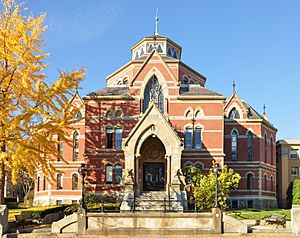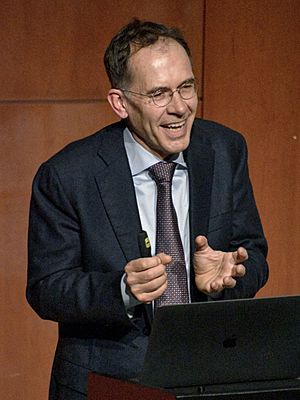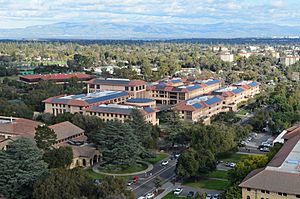Guido Imbens facts for kids
Quick facts for kids
Guido Imbens
|
|
|---|---|

Imbens in 2025
|
|
| Born |
Guido Wilhelmus Imbens
3 September 1963 Geldrop, Netherlands
|
| Nationality |
|
| Spouse(s) | Susan Athey |
| Institution | Stanford University |
| Field | Econometrics |
| Alma mater | Erasmus University (BA) University of Hull (MSc) Brown University (MA, PhD) |
| Doctoral advisor |
Anthony Lancaster |
| Doctoral students |
Rajeev Dehejia Alfred Galichon |
| Awards | Nobel Memorial Prize in Economic Sciences (2021) |
| Information at IDEAS / RePEc | |
Guido Wilhelmus Imbens is a famous Dutch-American economist. He was born on September 3, 1963. His work focuses on econometrics and statistics. Econometrics uses math and statistics to study economic data.
He is a professor at the Stanford Graduate School of Business at Stanford University. He has taught there since 2012.
In 2021, Imbens won half of the Nobel Memorial Prize in Economic Sciences. He shared the prize with Joshua Angrist. They won for their important work on understanding "cause and effect." Their research helped economists learn how to find out what causes what, especially using "natural experiments." These are real-life situations that happen by chance.
Contents
Early Life and Education
Guido Wilhelmus Imbens was born in Geldrop, the Netherlands. This was on September 3, 1963. When he was a child, Imbens loved playing chess. He has said that his interest in chess helped him with his passion for econometrics.
In high school, Imbens learned about the work of Dutch economist Jan Tinbergen. Because of Tinbergen's ideas, Imbens decided to study econometrics. He went to Erasmus University Rotterdam, where Tinbergen had taught. Imbens earned his first degree in Econometrics from Erasmus University in 1983.
He then got a Master of Science (M.Sc.) degree in Economics and Econometrics. This was from the University of Hull in the UK in 1986.
In 1986, one of Imbens' teachers, Anthony Lancaster, moved to Brown University in the United States. Imbens followed him to Brown to continue his studies. He earned two more degrees in economics from Brown University. He received a Master of Arts (A.M.) in 1989 and a Doctor of Philosophy (Ph.D.) in 1991.

Career and Research
Imbens has taught at several universities during his career. These include Tilburg University, Harvard University, the University of California, Los Angeles, and the University of California, Berkeley. Since 2012, he has been teaching at Stanford University.
He specializes in econometrics. This field uses special methods to figure out "causal inference." This means understanding if one thing truly causes another. For example, does more schooling cause higher earnings?
As of 2021, he is a professor of applied econometrics and economics at the Stanford Graduate School of Business. He is also a senior fellow at the Stanford Institute for Economic Policy Research (SIEPR).
Understanding Cause and Effect
Guido Imbens worked with other economists like Joshua Angrist and Alan Krueger. They focused on creating ways to help economists use "natural experiments." These are real-life situations that happen by chance. They help test ideas about "cause and effect." For example, they can study how more years of school might affect how much money someone earns.
Their methods are now used in many other fields. These include social sciences and medical research. Their work gives researchers tools to understand the limits of real-world experiments. This helps them better understand the effects of different actions or policies.
In 1994, Imbens and Angrist introduced an important idea called Local Average Treatment Effect (LATE). This helps find cause and effect from data that wasn't collected in a controlled experiment. They explained this in a paper called "Identification and Estimation of Local Average Treatment Effects." They showed how to use natural experiments. In these, chance and random events in the real world help researchers study effects. This is useful when controlled experiments are too expensive, take too long, or are not ethical. This idea had a big impact on research in economics and statistics.
In 2001, Imbens worked with statistician Donald Rubin and economist Bruce Sacerdote. They studied how "unearned earnings" (money you get without working for it) affect how much people work. They looked at winners of the Massachusetts Lottery. These winners received payments over many years, not all at once. This allowed the researchers to study the effects of having a guaranteed income. They found that winning the lottery had only a small effect on how much people worked. People who won a lot of money reduced their work hours a little. But those who won less did not change their work hours.
Some of Imbens' work was put into a book in 2015. He wrote it with Donald B. Rubin. The book is called Causal Inference for Statistics, Social, and Biomedical Sciences.
Around 2016, he and his wife, Susan Athey, started using machine learning methods. They used special types of random forests. This helped them estimate different effects in cause-and-effect models.
Nobel Memorial Prize in Economics

Guido Imbens received the 2021 Nobel Memorial Prize in Economic Sciences. He shared it with David Card and Joshua Angrist. They were honored for their important contributions to understanding cause and effect.
The Royal Swedish Academy of Sciences said that their work "provided us with new insights about the labor market." They also showed "what conclusions about cause and effect can be drawn from natural experiments." The Academy noted that their approach has spread to other fields. It has also "revolutionized empirical research" (research based on real-world observations).
Personal Life
Imbens has been married to fellow economist Susan Athey since 2002. She also teaches at the Stanford Graduate School of Business. The best man at their wedding was Joshua Angrist. Nineteen years later, Imbens and Angrist would share the Nobel Prize.
Guido Imbens holds dual citizenship. He is a citizen of both the United States and the Netherlands.
Honors and Awards
- Honorary Doctorate, University of St. Gallen, 2014
- Horace Mann Medal, Brown University Graduate School, 2017
- Nobel Memorial Prize in Economic Sciences, 2021
- Doctorate of Humane Letters, Brown University, 2022
- Great Immigrants Award, Carnegie Corporation of New York
- Honorary Doctorate, Erasmus University Rotterdam, 2023
See also
 In Spanish: Guido Imbens para niños
In Spanish: Guido Imbens para niños
 | James Van Der Zee |
 | Alma Thomas |
 | Ellis Wilson |
 | Margaret Taylor-Burroughs |


